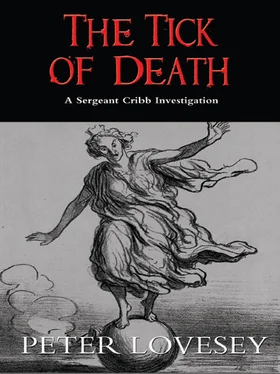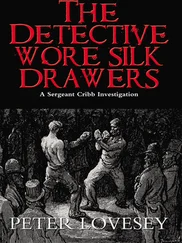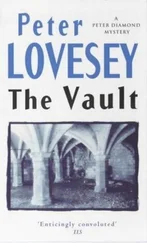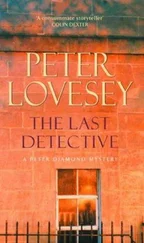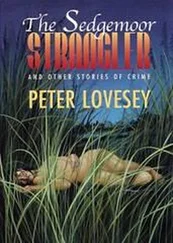Peter Lovesey - The Tick of Death
Здесь есть возможность читать онлайн «Peter Lovesey - The Tick of Death» весь текст электронной книги совершенно бесплатно (целиком полную версию без сокращений). В некоторых случаях можно слушать аудио, скачать через торрент в формате fb2 и присутствует краткое содержание. Жанр: Исторический детектив, на английском языке. Описание произведения, (предисловие) а так же отзывы посетителей доступны на портале библиотеки ЛибКат.
- Название:The Tick of Death
- Автор:
- Жанр:
- Год:неизвестен
- ISBN:нет данных
- Рейтинг книги:3 / 5. Голосов: 1
-
Избранное:Добавить в избранное
- Отзывы:
-
Ваша оценка:
- 60
- 1
- 2
- 3
- 4
- 5
The Tick of Death: краткое содержание, описание и аннотация
Предлагаем к чтению аннотацию, описание, краткое содержание или предисловие (зависит от того, что написал сам автор книги «The Tick of Death»). Если вы не нашли необходимую информацию о книге — напишите в комментариях, мы постараемся отыскать её.
The Tick of Death — читать онлайн бесплатно полную книгу (весь текст) целиком
Ниже представлен текст книги, разбитый по страницам. Система сохранения места последней прочитанной страницы, позволяет с удобством читать онлайн бесплатно книгу «The Tick of Death», без необходимости каждый раз заново искать на чём Вы остановились. Поставьте закладку, и сможете в любой момент перейти на страницу, на которой закончили чтение.
Интервал:
Закладка:
Peter Lovesey
The Tick of Death
CHAPTER 1
The infernal machine lay in an underground room in the Danger Buildings of the Royal Arsenal. A sandbag structure round the inspection-bench kept observers an arm’s length away. Illumination was provided by gaslight reflected through glass.
‘The first time I’ve ever set eyes upon one,’ said Detective-Sergeant Cribb, innocent of what was to come.
For all their destructive possibilities, the parts were pleasingly arranged in a metal cashbox. A cheap alarm clock from which the back had been removed. A pistol attached to it with copper wire, so that when the alarum was released, the revolving winder would be set in motion, and depress the trigger. Seven detonators ready in the box, their ends presented to the muzzle. Cakes of dynamite stacked around the side. The whole wrapped in cloth and wedged into a large leather portmanteau stuffed just as solidly with dynamite.
‘It would have made an appreciable alteration to Paddington station last February if the mechanism had worked,’ observed Colonel Martin, the Home Office Inspector of Explosives. A formidable crop of black whiskers covered three-quarters of his face, but his eyes were pale blue and had a wistful look.
The men from Scotland Yard visualized the scene of devastation in Mr Brunel’s great glass and iron structure.
‘Might I venture to inquire what prevented it from working?’ asked Detective-Inspector Jowett, after a decent interval.
‘Observe,’ commanded the Colonel, thrusting a wooden pointer in the direction of the bomb. His companions swayed back on their heels. ‘D’you see the brass plate on the back of the clock, under the gun? And d’you notice the pin at the corner? Well, gentlemen, the Great Western Railway owes the survival of its principal terminus to nothing of more consequence than that pin. It was fractionally dislodged when the bomb was put in place, and it projected far enough from the plate to check the deadly action of the alarum winder.’
‘Fancy that!’ said Inspector Jowett, so dedicated to the cause of personal advancement that he was ready to fancy anything a senior officer showed him. ‘Merely a pin, you say. By Jove, I detect the hand of Providence in this.’
‘A pity Providence was unable to prevent the explosion at Victoria station the same night,’ said Colonel Martin acidly. ‘Perhaps the directors of the London, Brighton and South Coast Railway should search their souls for an explanation. I tend to take a less spiritual view of things, Inspector. The working parts of an infernal machine are relatively simple to arrange, but their effectiveness depends on the proximity of a large and cumbersome mass of dynamite. When all this is encased in a portmanteau and conveyed in hazardous circumstances to the site selected for destruction, you may imagine that a delicate mechanism is liable to be displaced.’
‘I can imagine it perfectly, thanks to your lucid explanation,’ said Inspector Jowett.
The Colonel gave him a long look. ‘Well, that is what happened at Paddington on the night of February 25th. As you probably recall-’
‘Not only that,’ Jowett broke in. ‘Other bombs that had failed to detonate were found next day at two other stations. London Bridge and Ludgate Hill. I don’t know what happened to them, but you might find it worth your while to examine them, Colonel.’
‘Thank you. They are in the room behind you. Each of the alarums was set for one o’clock, the time the explosion took place in the cloakroom at Victoria. Unless you have other information, of course?’
‘Not at all. Simultaneous explosions. Ugly business. There’s an organisation behind this, Colonel, depend upon it.’
The Colonel indicated with a slight narrowing of the eyes that the possibility had not escaped him.
‘A conspiracy,’ Jowett continued without check, steaming ahead on all boilers. ‘No doubt about it. Dynamitards. They’re here in London leaving bombs in station cloakrooms like bowler hats. Question is, Colonel, what have you discovered about ’em? You can’t tell me this box of tricks hasn’t furnished you with information. I know you chaps from the Home Office too well for that.’
It was unfortunately clear that Inspector Jowett did not know Colonel Martin well enough to realise he was irritating him. ‘I forwarded a full report to your Special Political Branch at Scotland Yard two months ago. I suggest that you ask them to allow you to read it.’
‘Ah, now there’s a complication,’ said Jowett, impervious to sarcasm. ‘Your report might make good sense to me, but it is Sergeant Cribb here who will need to have the information, and without disrespect to anyone I would rather that he had it first-hand. Cribb does not know it yet, but he has a privileged status, Colonel. He is in a better position to provide Scotland Yard with information about the dynamite party than the whole of the Special Branch together. We are here on the highest authority.’
Cribb listened in disbelief. The purpose of the visit was a mystery to him. Jowett had simply summoned him to the Yard, hustled him into a hansom and driven him to Woolwich. Even when they drove through the main gate he could think of no reason for being in the Arsenal.
‘Very well, then,’ said Colonel Martin. ‘I’ll address myself to you, Sergeant. What do you know about infernal machines?’
‘Practically nothing, sir.’
‘Hm. Better not stand so close then. No, just my joke, Sergeant, just my joke, though what the wisdom is of assigning a novice to defeat the dynamiters, I cannot begin to apprehend.’
‘Nor me, sir.’
‘At least we understand each other. Let’s look at this contraption then, shall we?’ Colonel Martin stabbed at the bomb again with his pointer. ‘Cheap alarm clock, of American manufacture. Revolting name- Peep o’Day - wouldn’t be countenanced here. Cartridge-firing pistol. Imitation Remington, but it bears no maker’s imprint. Combined cap and cartridge similar to a type made at Bridgeport, Connecticut. Seven detonators containing the usual mixture of chlorate of potassium and fulminate of mercury. Simple metal cashbox with no distinguishing marks. Nothing to be gained from writing it down, Sergeant-it’s all in my report. Now take a careful look at the cakes of dynamite. Don’t count them-there’s thirty-nine altogether-just tell me what you see on the outside.’
The Colonel’s verbal dissection of the infernal machine was performed without a trace of conceit. Cribb warmed to him. ‘The letter A, sir, and the words Atlas Powder. A would indicate some form of classification, I expect.’
‘Good. It is the commercial mark for the highest and strongest form of dynamite. There are seven grades of the stuff manufactured by the Atlas people, at the Repauno Chemical Works, near Philadelphia. This grade contains seventy-five per cent of nitro-glycerine. Do you know what that is, Sergeant?’
‘I fancy I have heard of it, but. .’
‘It is the pure form of the most powerful explosive ever developed. Two volumes of sulphuric acid, one of nitric and half of glycerine together produce a substance so devilishly liable to explode that it is virtually unusable. For twenty years scientists tried to find a means of controlling it-that is to say, exploding it with certainty under confinement. The trick was done at last in 1865 by means of a detonating cap containing fulminate of mercury, developed by a Swede, who must be a millionaire by now. He patented his nitroglycerine under the name of Nobel’s Blasting Oil and sold it like hot cross buns. Trouble was that these buns were liable to blow up when the customers endeavoured to carry ’em home. There were some nasty accidents, gentlemen-uncommon nasty. But give Nobel his due-he persisted with his experiments until he discovered the ready means of absorbing the oil in porous substances. He tried numerous materials-paper, wood-shavings, brick-dust, clay-but none of them worked as well as a type of earth known as Kieselguhr, found in Hanover. It absorbed the nitro-glycerine and gave it the necessary stability. He called the preparation dynamite. It was not so powerful as pure nitro-glycerine, but considerably safer to handle, and still a great advance on gunpowder as an explosive.’
Читать дальшеИнтервал:
Закладка:
Похожие книги на «The Tick of Death»
Представляем Вашему вниманию похожие книги на «The Tick of Death» списком для выбора. Мы отобрали схожую по названию и смыслу литературу в надежде предоставить читателям больше вариантов отыскать новые, интересные, ещё непрочитанные произведения.
Обсуждение, отзывы о книге «The Tick of Death» и просто собственные мнения читателей. Оставьте ваши комментарии, напишите, что Вы думаете о произведении, его смысле или главных героях. Укажите что конкретно понравилось, а что нет, и почему Вы так считаете.
